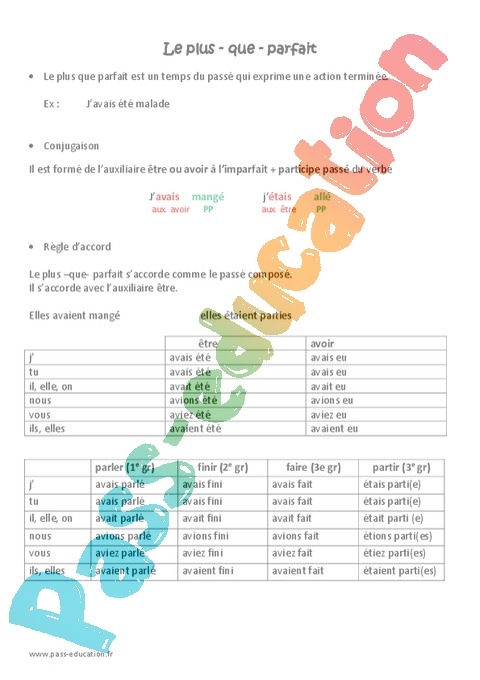
Le public littéraire attendait depuis des années la nouvelle poésie de Tex quand il a enfin retrouvé son inspiration. Not all instances of had + past participle in English are translated into plus-que-parfait in French.įor example, in French depuis is usually used with the imperfect ( not the pluperfect) and 'had just done something' is generally translated by venir de in the imparfait. She adored the innocent poems that Tex had written during his youth. But he changed his mind when he read the poems to Tammy.Įlle a adoré les poèmes innocents que Tex avait écrits pendant sa jeunesse. Mais il a changé d'avis quand il a lu les poèmes à Tammy.Ī few years later, he had abandoned all hope of literary fame.

Quelques années plus tard, il avait abandonné tout espoir de gloire littéraire. In affirmative sentences in French, it is often, but not always, accompanied by the adverb déjà (already).Ī l'âge de sept ans, Tex avait déjà rédigé dix poèmes.Īt the age of seven, Tex had already composed ten poems. In English the plus-que-parfait is indicated by had + past participle. In other words, the action in the plus-que-parfait is prior to another past action or moment. In past narration, the plus-que-parfait is used to express an action which precedes another past action or moment. Je n'avais pas mangé (I had not eaten), Je n'étais pas allé (I had not gone), etc. pas around the conjugated verb, which in this case is the auxiliary: The negation is formed in the usual manner by placing ne. Ils / elles étaient allé(e)s, they had gone Il, elle / on était allé(e), he, she (it) / one had gone Ils / elles avaient mangé, they had eaten Il, elle / on avait mangé, he, she (it) / one had eaten Plus-que-parfait = auxiliary in the imparfait + past participle of verb

The choice of auxiliary, être or avoir, is the same as for the passé composé (the Alamo of être applies). The pluperfect ( le plus-que-parfait) is formed with the auxiliary in the imparfait followed by the past participle of the verb. > ABOUT THIS SITE: Copyright Laurent Camus - Learn more / Help / Contact | Do not copy or translate - site protected by an international copyright | Legal | Cookies. | Get | Grammar | Guide | Harry Potter | Have | Homonyms | How words are built | Human body | I like, I dislike | Idioms | Imperative | Impersonal | Infinitive | Introducing someone | Inversion | Irregular verbs | Jobs | Journeys | Linking words | Literature | Make or do? | Making portraits, describing | Mars | Matilda | Methodology | Modals | Movements | Music | Nature | Negation | Newspaper | Nouns | Numbers | Online activities | Opinions | Opposite words | Particles | Passive voice | Past | Past habits | Phone calls | Placement tests | Plural | Poems | Politeness | Prepositions | Present | Present participle | Pronouns | Pronunciation | Punctuation | Quantities | Question Tags | Questions | Relative sentences | Say, tell or speak? | School | Several tests | Slang words, colloquial words | Snow | Songs | Speaking | Sports | Subject-Verb agreement | Subjunctive | Subordinate clauses | Suggesting | Synonyms | Tales | The Internet | The house | The weather | There is/There are | This or That? | To have someone do something | Towns | Translations | USA | United Kingdom | Video | Waiting for approval | What time is it? | With a lesson | Writing a letter | Clothes | Colours/Colors | Comparisons | Compound words | Conditional and hypothesis | Conjunctions | Contractions | Countries and nationalities | Dates, days, months, seasons | Dictation | Direct/Indirect speech | Diseases | Etre | Exclamative sentences! | False friends | Family | Films | Find the correct tense | Find the missing letter | Find the word | Food | Frequent mistakes | Future | Games | Gender | General | Geography, history, politics, literature.

| Banks, money | Beginners | Betty's adventures | Bilingual dialogues | Business | Buying in a shop | Capital letters | Cars | Celebrations: Thanksgiving, new year. | Adjectives | Adverbs | Agreement/Disagreement | Alphabet | Animals | Articles | Audio test | BE, HAVE, DO, DID, WAS. LESSONS AND TESTS: Abbreviations and acronyms.


 0 kommentar(er)
0 kommentar(er)
